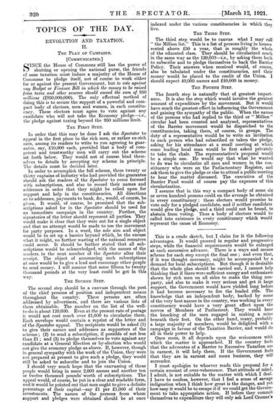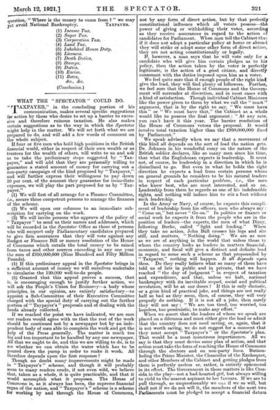TOPICS OF THE DAY.
REVOLUTION AND TAXATION.
H.
SLNCE the House of Commons still has the power of shutting or opening the national purse, the friends of sane taxation must induce a majority of the House of Commons to pledge itself, not of course to work either for or against the present Government, but to vote against any Budget or Finance Bill in which the money to be raised from taxes and other sources should exceed the sum of 950 millions (n50,000,000). The only effectual method of doing this is to secure the support of a powerful and com- pact body of electors, men and women, in each constitu- ency. These electors must agree to vote against any candidate who will not take the Economy pledge—i.e., the pledge against taxing beyond the 950 millions limit.
THE FIRST STEP.
In order that this may be done I ask the Spectator to appeal in the first place to the rich men, or rather ex-rich men, among its readers to write to you agreeing to guar- antee, say, £10,000 each, provided that a body of com- petent and trustworthy men will carry out the scheme set forth below. They would not of course bind them- selves to details by accepting my scheme in principle. The details must be decided later.
In order to accomplish the full scheme, these twenty or thirty captains of industry who had provided the guarantee should ask the readers of the Spectator to come forward with subscriptions, and also to record their names and addresses in order that they might be relied upon for support and help in the constituencies. All directions as to addresses, payments to bank, &c., would, of course, be given. It would, of course, be promised that the sub- scriptions asked for in the Spectator should be used for an immediate campaign in the country. Further, the signatories of the letter should represent all parties. They would make it clear that they were out for a single object and that no attempt would be made to use the movement for party purposes. In a word, the sole aim and object would be to set up a barrier beyond which, be the excuse what it might, no further wasting of the national resources could occur. It should be further stated that all sub- scriptions would be acknowledged, with the names of the senders, in the next number of the Spectator after their receipt. The object of announcing such subscriptions at once would be to give a lead and encourage other people to send money. I will assume that some fifteen to twenty thousand pounds at the very least could be got in this way.
THE SECOND STEP.
The second step should be a canvass through the post of the chief persons of position and independent means throughout the country. These persons are often addressed by advertisers, and there are various lists of them obtainable. The number on the list of the well- to-do is about 120,000. Even at the present rate of postage it would not cost much over £1,000 to circularize them. Each envelope would contain a reprint of the letter and of the Spectator appeal. The recipients would be asked (1) to give their names and addresses as supporters of the scheme ; (2) to send a subscription, if possible of not less than El ; and (3) to pledge themselves to vote against any candidate at a General Election or by-election who would not give the economy pledge as above. If, however, though in general sympathy with the work of the Union, they were not prepared at present to give such a pledge, they would still be asked to subscribe and to join the Union. I should very much hope that the canvassing of these people would bring in some 2,000 names and another ten or twelve thousand pounds' worth of subscriptions. The appeal would, of course, be put in a clear and readable form, and it would be pointed out that men ought to give a definite percentage of their capital--say £1 per £1,000 of their investments. The names of the persons from whom ment to take appropriate action. If before they commit . support and pledges were obtained should be at once themselves to expenditure they will only ask Lord Cromer's indexed under the various constituencies in which they live.
THE THIRD STEP.
The third step would be to canvas what I may call " the Million list." This is a list of persons living in houses rented above £50 a year, that is roughly the whole of the educated class. They should be circularized much in the same way as the 120,000—i.e., by asking them both to subscribe and to pledge themselves to back the Barrier Policy. Their answers when received would, of course, also be tabulated under the constituencies, and their money would be placed to the credit of the Union. I should expect 40,000 names and £40,000 in money.
THE FOURTH STEP.
The fourth step is naturally that of greatest import- ance. It is also the step which would involve the greatest amount of expenditure by the movement. But it would have much the greatest effect in influencing the Government and gaining the sympathy of the public. When the names of the persons who had replied to the third or " Million " circular had been counted and analysed, representatives of the Barrier movement would be dispatched to the constituencies, taking them, of course, in groups. The duty of a representative would be to write an invitation to each person who had subscribed or taken the pledge, asking for his attendance at a small meeting at which some leading local man would be first asked privately to take the chair. The representative's proposal would be a simple one. He would say that what he wanted to do was to circularize all men and women in the con- stituency who were on the Parliamentary Register, and ask them to give the pledge or else to attend a public meeting to hear the matter discussed. The executive of the Barrier Fund would of course pay the expenses of this circularization.
I assume that in this way a compact body of some six or seven hundred persons could on the average be obtained in every constituency ; these electors would promise to vote only for a pledged candidate, and if neither candidate would give the pledge, and a third could not be found, to abstain from. voting. Thus a body of electors would be called into existence in eveiy constituency which would represent the cause of Economy.
This is a crude sketch, but I claim for it the following advantages. It would proceed in regular and progressive steps, while the financial requirements would be enlarged at each successive advance. There is a ways and means scheme for each step except the final one ; and even that, if it was thought necessary, might be accompanied by a demand for local subscriptions. But though it is desirable that the whole plan should be carried out, I cannot help thinking that if there were sufficient energy and enthusiasm shown by rich men on all sides to make the thing non- party, and also to make it very serious and get it large support, the Government would have yielded long before it had become necessary to fire the loaded rifle. The knowledge that an independent body, backed by some of the Very best names in the country, was working in every constituency would have a very great effect upon the nerves of Members of Parliament. They would hear the knocking of the men engaged in making a mine beneath their feet. On the other hand, many, probably a large majority of members, would be delighted with a campaign in favour of the Taxation Barrier, and would do all in their power to help. Once more, it all depends upon the seriousness with which the matter is approached. If the country feels that the advocates of a Barrier to Excessive Taxation are in earnest, it will help them. If the Government feels that they are in earnest and mean business, they will surrender.
I must apologize to whoever reads this proposal for a certain amount of over-vehemence. That attitude of mind, I admit, is not suitable to the matter with which I deal. I have to confess, however, that I feel a sense of savage indignation when I think how great is the danger, and yet how easy it would be to escape it if we could get the Goyern- question,: " Where is the money to come from " we may yet avoid National Bankruptcy. TAXPAYER.
(1) Income Tax.
(2) Super Tax.
(3) Corporation Tax.
(4) Land Tax.
(5) Inhabited House Duty.
(6) Licences.
(7) Death Duties.
(8) Stamps.
(9) Duties.
(10) Excise.
(11) Rates, &c., &c.
(Conclusion.)



































 Previous page
Previous page